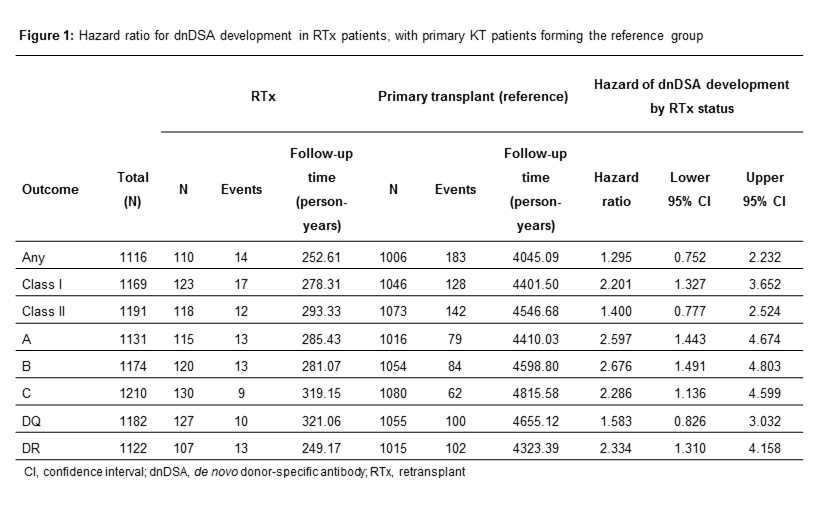De Novo Donor-Specific Antibody Formation After Kidney Retransplant Is Associated with Specificity Against Class I.
1Northwestern University Transplant and Outcomes Research Collaborative (NUTORC), Chicago
2Astellas Pharma Global Development, Northbrook
3Now with UCB, Atlanta
4Dept of Preventive Medicine, Northwestern University, Chicago
Meeting: 2017 American Transplant Congress
Abstract number: B149
Keywords: Alloantibodies, HLA antibodies, Kidney transplantation, Retransplantation
Session Information
Session Name: Poster Session B: Kidney Complications II
Session Type: Poster Session
Date: Sunday, April 30, 2017
Session Time: 6:00pm-7:00pm
 Presentation Time: 6:00pm-7:00pm
Presentation Time: 6:00pm-7:00pm
Location: Hall D1
Retransplant (RTx) patients are often sensitized due to donor-specific antibody (DSA) formation, with higher acute rejection rates during subsequent transplants vs patients without DSA. However, little data exist on antibody specificity distribution, and hazard of transplants regarding de novo DSA (dnDSA) formation. We evaluated how prior transplant contributes to dnDSA in one of the largest, single-center, retrospective cohorts to date, and with modern immunosuppression.
Single-center demographic and laboratory data were collected for all adult kidney transplant (KT) patients from 2007–2015. For primary vs RTx patients, DSA was assessed per protocol at transplant (time 0), 3 and 6 months, 1 and 2 years, and for cause. Continuous variables were summarized by mean/standard deviation (SD), and categorical variables by number/proportion.
Overall, 1386 adult KT patients (primary transplant: n=1224; RTx: n=162) were followed for ≤8 years, >4,500 patient-years (py) of follow-up. Recipient and donor characteristics were generally similar between primary and RTx groups; however, RTx patients were younger at time of most recent transplant, a greater proportion were Caucasian, and mean maximum panel reactive antibody score was higher. Incidence rate of dnDSA in RTx vs primary KT was: Class I, 5.5/100 vs 4.5/100 py; Class II, 6.1/100 vs 3/100 py. RTx vs primary KT patients were more likely to develop dnDSA (hazard ratio (HR) 1.42), with Class I specificities presenting greater hazard than Class II for dnDSA formation. RTx patients were more likely to develop dnDSA in human leukocyte antigen A, B, C and DR loci (HRs 2.3–2.7) (Figure 1). RTx vs primary KT were more likely to develop dnDSA. However, hazard for Class I dnDSA development was equal to or greater than for Class II. As graft loss is mostly associated with Class II formation, impact of these data is unknown, requiring further study.
RTx vs primary KT were more likely to develop dnDSA. However, hazard for Class I dnDSA development was equal to or greater than for Class II. As graft loss is mostly associated with Class II formation, impact of these data is unknown, requiring further study.
CITATION INFORMATION: Atiemo K, Ho B, Bhagat H, Lee E, Daud A, Kang R, Montag S, Zhao L, Schwartz J, Ladner D. De Novo Donor-Specific Antibody Formation After Kidney Retransplant Is Associated with Specificity Against Class I. Am J Transplant. 2017;17 (suppl 3).
To cite this abstract in AMA style:
Atiemo K, Ho B, Bhagat H, Lee E, Daud A, Kang R, Montag S, Zhao L, Schwartz J, Ladner D. De Novo Donor-Specific Antibody Formation After Kidney Retransplant Is Associated with Specificity Against Class I. [abstract]. Am J Transplant. 2017; 17 (suppl 3). https://atcmeetingabstracts.com/abstract/de-novo-donor-specific-antibody-formation-after-kidney-retransplant-is-associated-with-specificity-against-class-i/. Accessed February 16, 2026.« Back to 2017 American Transplant Congress
